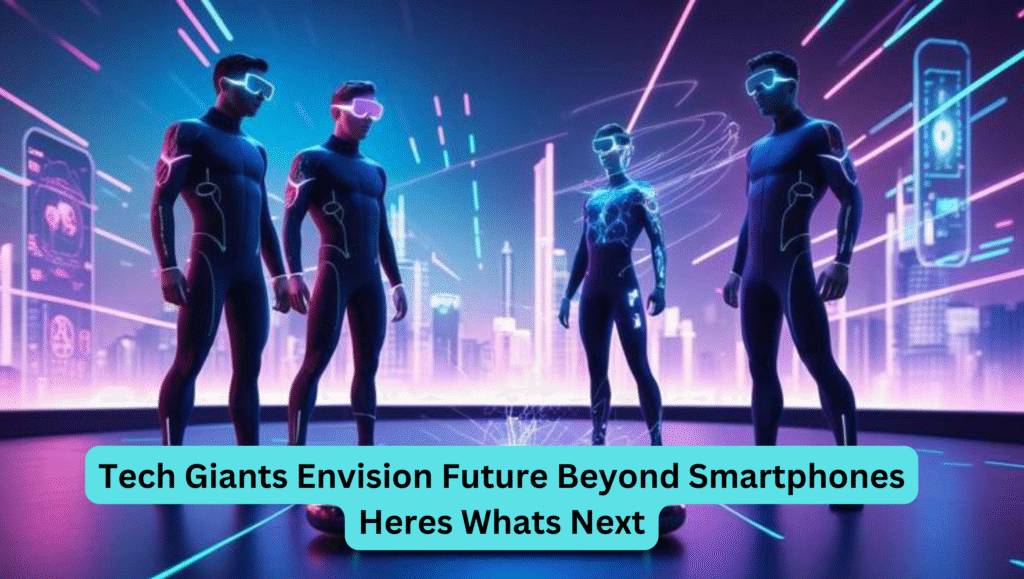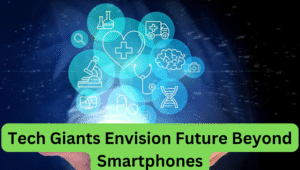Introduction
For more than a decade smartphones have defined the digital age. They have revolutionized the way we communicate work travel and think. But the tech world is anything but stagnant. From Silicon Valley to Seoul a new chapter is being written in boardrooms and research labs one where smartphones are no longer the centerpiece. Tech giants envision future beyond smartphones imagining a world driven by artificial intelligence AI augmented reality AR and wearable computing. These innovations are no longer experimental they are quickly becoming the foundation of the next era in digital interaction
1. Why Tech Giants Are Moving Beyond Smartphones.
The modern smartphone is a marvel of engineering but it also comes with limitations. Screens occupy our hands and eyes. App fatigue is real. And the deluge of notifications is draining. Recognizing these pain points, tech leaders are now focusing on creating post-smartphone experiences that prioritize immersion accessibility and freedom from screens.
Apple’s CEO Tim Cook has openly stated that AR will be as important as the iPhone. Meta Mark Zuckerberg has shifted focus entirely to the metaverse and smart wearables. Google is investing heavily in ambient computing where devices fade into the background and technology becomes invisible but ever-present.
These companies just react to trends by shaping them. With enormous R&D budgets and control over both hardware and software ecosystems they are uniquely positioned to bring futuristic ideas to market.
2. Smart Glasses and AR: The First Real Smartphone Replacements.
Smart glasses once a sci-fi fantasy are now poised to become the gateway to the post smartphone world. Meta has released Ray-Ban smart glasses that let you take calls, stream music and record what you see. Apple Vision Pro offers a high-end AR/VR experience that could redefine productivity gaming and media consumption.
The power of smart glasses lies in their ability to blend the digital and physical worlds. Instead of looking down at a phone you look forward with digital content layered naturally into your environment. Want to navigate a city? Directions appear on the street itself. Reading an article? It floats in your field of view. Getting a call? A subtle notification pops up on the edge of your glasses.
AR is the technology that makes this possible. With advancements in spatial computing these glasses can understand your environment and place digital content exactly where it makes sense. This shift promises to replace not just phones but screens altogether.
3. AI Powers Experiences: Smarter Than Smartphones
While hardware solution AI is becoming the real driver of post-smartphone innovation. Today voice assistants like Siri and Alexa are primitive compared to what is coming. Future AI will be deeply embedded in every interaction learning, predicting and executing tasks before you even ask.
A talking picture in your office and your AI assistant running on your glasses or earbuds taking notes from your meetings adjusting the lighting and pulling up that presentation you reviewed the night before. Or travel to a new country and your device automatically translating signs conversations and menus in real times.
Tech giants envision a future beyond smartphones where AI acts not as a tools but as a partner. This shift takes us from command based interaction to context sensitive proactive assistance that will change how we live and work.
4. The Post-Smartphone Lifestyle: What Will Actually Change?
The way we live socialize and work will be fundamentally different in a world without smartphones. Here how: tech giants envision future beyond smartphones
Communication: Instead of texting holographic projections or spatial audio could let you interact with loved ones as if they in the same room.
Navigation: No more glancing at your phone for maps directions are projected into your environment.
Shopping: Try on clothes virtually see how furniture fits in your spaces and pay with a glance.
Health Monitoring: Wearables will continuously tracks your vitals and send real times alert to your doctors.
Productivity: Workspaces need monitors. Virtual desktops can be displayed anywhere customized for every task.
These future fantasies they are under active development by companies like Apple Meta Google and Samsung. The next decode will see the slow phasing out of smartphones in favor of more integrated intelligent solutions.
5. What Tech Giants Envision for 2030 and Bonds.
By 2030 the smartphones may be as outdated as flip phones are today. Apple is likely to have fully transitioned to spatial computing. Meta Horizon Worlds and smart glasses may dominate virtual social interaction. Google ambient computing vision could make interactions with screens feel quaint.
Tech giants envision a future beyond smartphones where every device in your life from your glasses to your car to your refrigerator is connected and intelligent. This is a world where you use technology and you live with it. It fades into the background and responds as naturally as a human conversation.
The implications are profound. Not only for consumers but for industries from education and retail to healthcare and urban planning. This future will require new laws, ethics and digital boundaries but it will also unlock human potential in ways only begun to imagine.
Conclusion
Yes and no. Smartphones disappear overnight. But their dominance is waning as newer more intuitive technologies take center stage. tech giants envision future beyond smartphones not to eliminate the phone but to evolve it into something better, more personal, more immersive, more intelligent.
The next decade will be defined by devices you wear and not hold. By interactions you tap but experience. And by intelligence that anticipates your needs before you even think of them.
The smartphones is dead but its future form will be unrecognizable. Are you ready for whats next?
FAQs
Q1: What device will replace smartphones?
Smart glasses powered by AI and AR are the most likely successors offering hand free access to digital content in real-time.
Q2: What are tech companies doing to Beyond smartphones?
Apple Meta and Google are investing in wearable devices spatial computer and AI to create seamless digital-physical experiences.
Q3: Will smartphones disappear completely?
Not right away but their role will shrink significantly over the next decode as immersive tech becomes mainstream.
Q4: How will AI impact future devices?
AI will shift from reactive assistants to proactive digital companions handling tasks understanding context and anticipating user needs.
Q5: Is this technology safe and accessible?
The transition raises valid concerns about privacy affordability and data ethics but companies and governments are working to address them.





